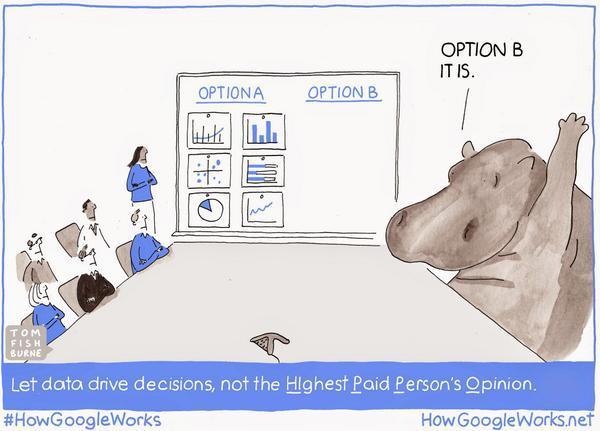Usuarios del Club TRPlane
HiPPO, el acrónimo de «la opinión de la persona mejor pagada» (Highest Paid Person’s Opinion en inglés), es el directivo que aparece en un proyecto en el último momento y ofrece una opinión personal, dejando de lado todo los datos disponibles, sobre qué incluir para que el proyecto sea un éxito.
En conjunto, la teoría de la HiPPO describe la dependencia de una organización en el instinto humano en lugar de los datos en el proceso de toma de decisiones.

Ron Johnson, ex vicepresidente senior del área minorista de Apple, se incorporó a JC Penney con una misión: cambiar la tendencia de constante descenso en los ingresos durante tres años con la que la compañía estaba luchando.
En ese momento, Johnson también era sin duda la persona mejor pagada de la empresa, con 52 millones de dólares. Durante su mandato como CEO, Johnson confió en su instinto en lugar de en los datos disponibles e ignoró tanto las perspectivas históricas como la nueva información. Esta actitid y manera de hacer produjo internamente dos tipos de empleados:
- Escépticos: reacios a seguir una estrategia que no esté respaldada por datos.
- Creyentes: verdaderos seguidores de un líder fanático del control que podría llevar a la empresa al cielo de la innovación y las ganancias.
Ron Johnson finalmente salió de JC Penney con unos logros muy lejanos de los objetivos para los que había sido contratado:
- La compañía se gastó casi mil millones de dólares en 17 meses, reduciendo su capacidad efectivo de 1.8 mil millones a 930 millones de dólares.
- Los ingresos cayeron un 25 por ciento en 2012.
- La capitalización de mercado de la compañía cayó casi un 50 por ciento durante la supervisión de Johnson.
Pruebas A / B al rescate
A la pregunta sobre cómo lidiar con un HiPPO que claramente está por encima en el organigrama, las pruebas AB pueden ser una buena respuesta.
Durante la ejecución de un proyecto, hay muchas posibilidades de recibir comentarios del superior sin ninguna base documentada. En lugar de simplemente responder algo como “Su opinión, aunque interesante, es irrelevante”, lo que podría poducir una llamada de recursos humanos para una inminente salida de la empresa más temprano que tarde, es mejor optar por “¡Gran idea, jefe! Lo probaremos «.
Y realmente se prueba.
Se seleccionan un par de métricas básicas y relevantes, se elabora una hipótesis y se aplican las sugerencias que el jefe ha proporcionado amablemente. Después de eso, se prueba el resultado en un subconjunto de los clientes.
Si la nueva versión tiene un rendimiento inferior al actual (en cualquiera de las métricas para las que se formuló la hipótesis), tiene un buen argumento para justificar por qué la empresa debería confiar en decisiones basadas en datos, en lugar de en las ocurrencias gerenciales aprendidas en las mejores escuelas de negocios.
Visión Google
En la web https://www.howgoogleworks.net/ se hace una promoción del libro del mismo título escrito ni más ni menos que por Eric Schmidt, Jonathan Rosenberg y Alan Eagle que son, respectivamente, el CEO, Director de clientes y director de comunicación de Google. Se pueden ver más detalles respecto a la posición de los autores en la web.
El libro es de septiembre del 2014 y es absolutamente imprescindible leerlo, y sobre todo, reflexionar alrededor del por qué las decisiones que se han tomado, la dirección, los errores, aciertos y la gestión de los mismos.
Ya entonces se resalta lo nocivos que son este tipo de perfiles, las decisiones de los mismos, para una empresa.
En la web hay un documento resumen en formato word y explica la posición, ya en aquellas fechas, de Google respecto a los HiPPOs (punto 13 de los 50).
Si hay que tener cuidado con un HiPPO, no hay que olvidar al ZEBRA.

